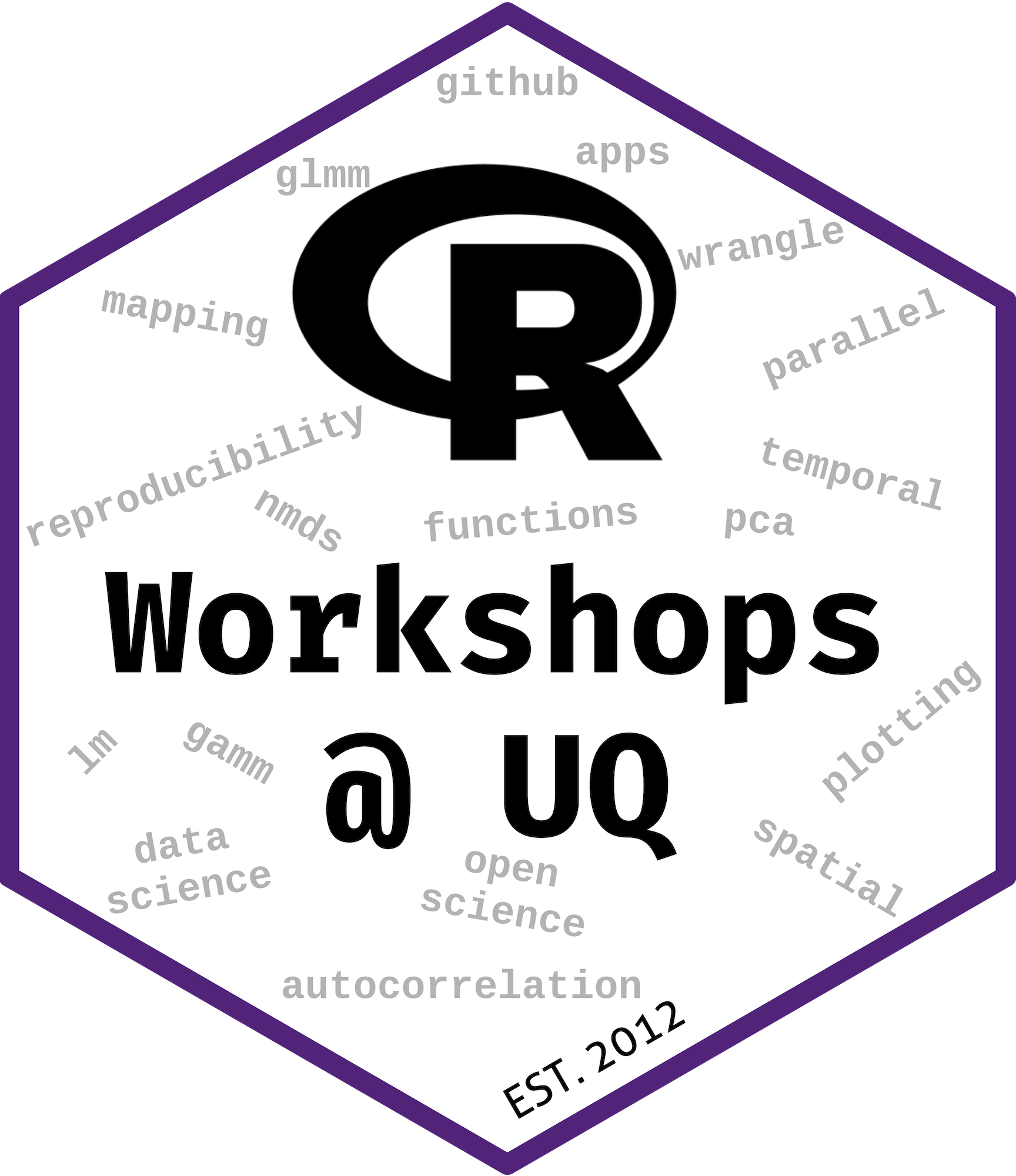2026 Summer R Workshops @ UQ
Introduction to R and Statistical Modelling
Are you ready to embark on your journey into the world of R and statistical analysis? Transform your research questions into robust statistical insights with our 2026 Summer R Workshops in an immersive exploration of R programming and statistical modelling.
These comprehensive, hands-on workshops are designed for beginners and researchers who want to build a solid foundation in R programming and progress through to advanced statistical techniques. Whether you’re completely new to R or looking to strengthen your statistical modelling skills, join us to develop the analytical expertise essential for modern research!
This workshop series will run in-person only 9-13 February 2026 at the University of Queensland. You are free to attend as many or as few days as you would like.
The costs are $300 (regular) and $200 (students) per day. All proceeds from these workshops are used to support research at UQ and UniSC.
Registrations are now open for our 2026 Summer Workshops. Register now now so you don’t miss out.
Day 1: Introduction to R and the tidyverse
In the “Introduction to R and the tidyverse” workshop, we will start slowly. We will help familiarise you with R (the programming language), RStudio (the interface we recommend to program R in) and the tidyverse (a set of programming packages we use to speed up analysis and plotting). By the end of the day, you will be confidently loading datasets, writing basic code in R to manipulate the data, and plotting outputs from your analysis.
Difficulty rating: 🤓⚪⚪⚪⚪
Assumed knowledge: No prior programming or R experience required. This is a beginner-friendly introduction to R. You should be comfortable using your laptop, installing software, navigating file systems, and creating/organizing files and folders. Basic familiarity with spreadsheets (e.g., Excel, Google Sheets) is helpful but not essential.
NOTE: If you are starting with “Day 1: Introduction to R and the tidyverse” we recommend you only register for (at most) Days 1-2 as Days 3-5 will cover material that requires a robust knowledge of R programming. After completing Days 1-2 we would encourage you to consider our July workshops for further tips/trick in R programming, and then come back the following February to complete the advanced statistics covered on Days 3-5.
Day 2: Linear modelling
Today is all about learning the foundations of statistical modelling to analyse your data. We’ll start with simple linear models and explore why we fit models, learn how to interpret model output and how to upgrade your code to design more advanced linear models. We then learn how to select the best model, examining model diagnostics and plotting the output. Where model diagnostics indicate a violation of model assumptions, we consider what transformations might improve the model fit. We finish by learning how to fit Generalised Linear Models (GLMs) for binary and count response variables, predicting in link space compared to predictor space, and dealing with different error structures.
Difficulty rating: 🤓🤓⚪⚪⚪
Assumed knowledge: Foundational statistics including hypothesis testing, p-values, confidence intervals, and basic concepts like correlation and regression. Completion of Day 1 or equivalent R experience (loading data, basic data manipulation, creating simple plots). Familiarity with RStudio and running R scripts is essential.
Day 3: Mixed modelling
In this workshop you will learn how to fit Linear Mixed Models (LMMs), Generalised Linear Mixed Models (GLMMs), Generalised Additive Models (GAMs), and Generalised Additive Mixed Models (GAMMs). Mixed-effects models build on generalised linear models (GLMs) and have observations that are grouped in some way. This explicit recognition of grouping of observations within the model structure resolves many of the frequently encountered challenges associated with non-independence of observations, nested (hierarchical) designs, and spatial and temporal structuring. GAMs are extensions of GLMs and use flexible smoothers (wiggly lines) rather than mathematical equations to describe the relationship between the response and a set of predictors.
Difficulty rating: 🤓🤓🤓⚪⚪
Assumed knowledge: Solid understanding of linear and generalized linear models (Day 2 material). At least 6 months of regular R programming experience, including data wrangling with tidyverse, writing custom functions, and interpreting model diagnostics. Some familiarity with concepts like random effects, nested designs, and non-independence will be advantageous.
Day 4: Spatial modelling with temporal and spatial autocorrelation
Most datasets aren’t independent, and ignoring spatial and temporal correlation doesn’t just violate assumptions, it produces wrong answers. This workshop equips you to model complex, structured data with confidence using Generalised Additive Models (GAMs) with correlated residual structures. You’ll learn to diagnose autocorrelation in time series, point-based spatial data, and gridded aerial datasets, then address it using structured and penalised random effects for spatial, temporal, and spatiotemporal dependencies. By covering topics including model checking, validation, and interpretation, you’ll learn to transform messy, correlated data into defensible insights.
Difficulty rating: 🤓🤓🤓🤓⚪
Assumed knowledge: Strong proficiency in linear, generalized, and mixed models, plus GAMs (Days 2-3 material). Minimum 6-12 months of active R programming with ability to confidently understand functions, debug code, and create visualisations. Understanding of spatial/temporal data structures, autocorrelation concepts, and matrix operations will be beneficial.
Day 5: Multivariate statistics
This workshop will cover data analysis when you have multiple responses (i.e., multiple y-variables). We will discuss clustering (finding groups in data), ordination (displays multivariate data in fewer dimensions so you can more easily visualise patterns — such as non-metric MultiDimensional Scaling (nMDS) and Principal Components Analysis (PCA) and other joint species distribution model techniques) and how to infer environmental drivers of any patterns identified.
Difficulty rating: 🤓🤓🤓⚪⚪
Assumed knowledge: Solid foundation in linear and generalized linear models (Day 2 material). At least 6 months of R experience with data manipulation, model fitting, and visualization. Familiarity with multivariate datasets and basic matrix algebra concepts is helpful. Understanding of distance measures and similarity matrices will enhance learning but is not required.
